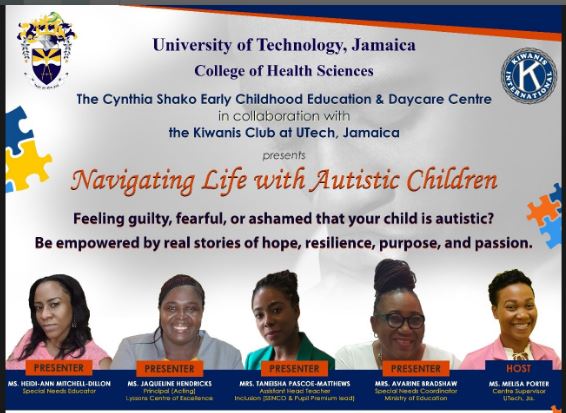“Focus on the positive…Ignore the stigma”. This message encapsulated the virtual Autism Awareness Seminar hosted by the Cynthia Shako Education and Daycare Center in collaboration with the Kiwanis Club at UTech, Jamaica on Wednesday. Held under the theme: ‘Navigating Life with Autistic Children’, the host Melisa Porter explained that the seminar was created to encourage parents not to lose hope while raising an autistic child. The speakers – Jacqueline Hendricks, Heidi-Ann Mitchell-Dillon and Taniesha Pascoe-Matthews – all shared their real-life stories on how they cope with the responsibility of parenting a child on the autism spectrum.
Show Love
Jacqueline Hendricks, Acting Principal of the Lyssons Centre of Excellence, was the first to share her story of being the mother of an 18-year-old autistic son. Hendricks noted that being a parent of a child with special needs is not easy but she is coping with the responsibility. “I’m not afraid to take him [my son] out…Doing that gives hope to other persons in St. Thomas.” She also stated that parents should not blame themselves if their child is on the autism spectrum. “Parents do not blame yourself…all you have to do is show them love, love, love and have a relationship with your creator.”
Heidi-Ann Mitchell-Dillon, a special needs educator spoke of her son, who was diagnosed with Autism spectrum disorder (ASD) and was non-verbal at age three. She notes that when he was diagnosed, she became depressed. “I was grieving and didn’t know what to do when I found out he was diagnosed with autism spectrum disorder.” Despite his diagnosis, Mitchell-Dillon explained that she exerted all her efforts to get help for her son. This resulted in her son’s autism improving significantly. Dillon notes that after her son was diagnosed, she remained positive and exposed him to fun activities to assist him. “I strategically exposed him to fun activities such as football, swimming, puzzles, chess and building blocks.”

To deal with anxiety, Mitchell-Dillon added that an established routine and assessment is very important. She added that beginning the process of getting help aids in relieving anxiety. She also encouraged parents to “surround yourself with support and begin the process, be consistent and committed. It may seem hard but focus on the positive,” Mitchell-Dillon said.
Support for Autistic Persons
Taniesha Pascoe-Matthews, assistant head teacher at Inclusion in the United Kingdom and mother of two children with autism, provided information about a variety of apps which support autistic persons in schools. These apps are developed to help people who are non-verbal and is designed to help autistic children design confidently and achieve language milestones. Some are these apps include: Proloquo2Go, CommBoards Lite, Language Therapy for Kids-MITA and Endless Reader. She also suggested ways to help cope with autistic children in schools who are having a meltdown, stating that, “in times of meltdown, give them space, remove demands, ensure students are in a safe environment and have a calm reassurance.”
Guest speaker, Avarine Bradshaw, Special Needs Coordinator at the Ministry of Education, Youth and Information (MOEYI), highlighted the support offices around the island for autistic children and their parents to get help. She also stated that the roles of the Special Education Unit are to provide training, public awareness and program development. Bradshaw further explained the variety of services and resources available for autistic children. “Special education unit are across the seven regions. Children with special needs especially those with ASD are to be supported at home and tablet distribution given equal priority with other groups within the education system. Grants are available for therapy under the Jamaica Council for Persons with Disabilities (JCPD).”
Reported by Chrisancia Robinson
